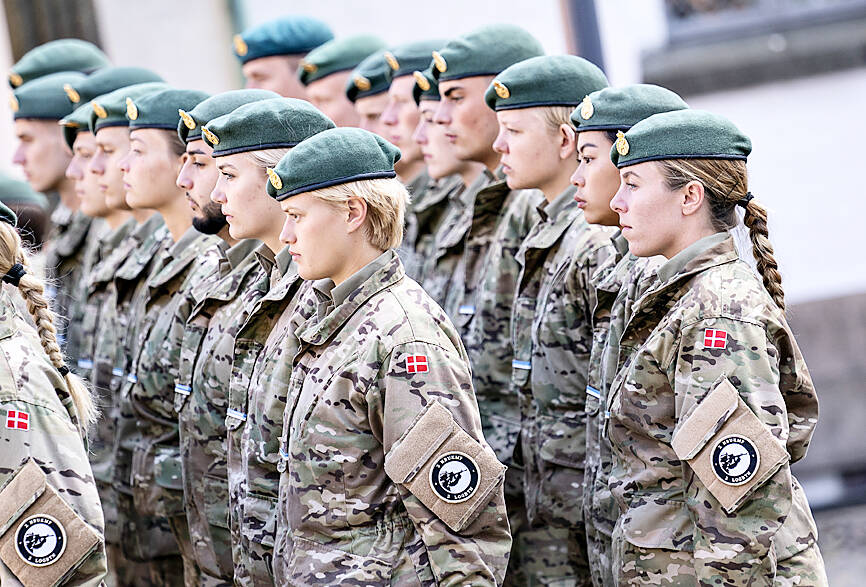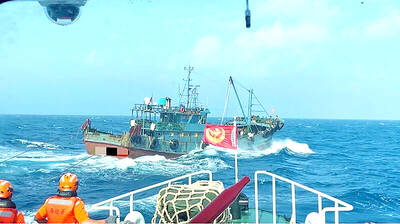Denmark wants to increase the number of young people doing military service by extending conscription to women and increasing the time of service from four months to 11 months for both genders, Danish Prime Minister Mette Frederiksen said on Wednesday.
“We do not rearm because we want war. We are rearming because we want to avoid it,” Frederiksen told a news conference.
She said the government wants ”full equality between the sexes.”

Photo: EPA-EFE
Denmark has up to 9,000 professional troops on top of the 4,700 conscripts undergoing basic training, official figures showed.
The government wants to increase the number of conscripts by 300 to reach a total of 5,000.
The country is a member of the NATO alliance and a staunch supporter of Ukraine in its war against Russia’s invasion.
Danish Minister of Foreign Affairs Lars Lokke Rasmussen said that “Russia does not pose a threat to Denmark.”
“But we will not bring ourselves to a place where they could come to do that,” Lokke Rasmussen said.
All physically fit men over the age of 18 are called up for military service, which lasts about four months. However, because there are enough volunteers, there is a lottery system, meaning not all young men serve.
Last year, there were 4,717 conscripts in Denmark. Women who volunteered for military service accounted for 25.1 percent of the cohort, official figures showed.
Danish Minister of Defense Troels Lund Poulsen said the new system would require a change in the law, which he said would happen next year and take effect in 2026.
The security policy situation in Europe “has become more and more serious, and we have to take that into account when we look at future defense,” Lund Poulsen said.
“A broader basis for recruiting that includes all genders is needed,” he said, adding that it would will create “a more versatile and more complete defense.”
Under the plan for which there likely is a majority in the Danish parliament, conscripts would first spend five months in basic training, followed by six months in operational service along with supplementary training.
In 2017, Sweden instituted a military draft for both men and women because the Swedish government spoke of a deteriorating security environment in Europe and around Sweden.
The Scandinavian country had previously abolished compulsory military service for men in 2010, because there were enough volunteers to meet its military needs. It never had a military draft for women before.
Norway in 2013 introduced a law applying military conscription to both sexes.

The Republic of China (ROC) is celebrating its 114th Double Ten National Day today, featuring military parades and a variety of performances and speeches in front of the Presidential Office in Taipei. The Taiwan Taiko Association opened the celebrations with a 100-drummer performance, including young percussionists. As per tradition, an air force Mirage 2000 fighter jet flew over the Presidential Office as a part of the performance. The Honor Guards of the ROC and its marching band also heralded in a military parade. Students from Taichung's Shin Min High School then followed with a colorful performance using floral imagery to represent Taiwan's alternate name

The Ministry of the Interior (MOI) is to tighten rules for candidates running for public office, requiring them to declare that they do not hold a Chinese household registration or passport, and that they possess no other foreign citizenship. The requirement was set out in a draft amendment to the Enforcement Rules of the Public Officials Election and Recall Act (公職人員選舉罷免法 ) released by the ministry on Thursday. Under the proposal, candidates would need to make the declaration when submitting their registration forms, which would be published in the official election bulletin. The move follows the removal of several elected officials who were

COGNITIVE WARFARE: Chinese fishing boats transmitting fake identification signals are meant to test Taiwan’s responses to different kinds of perceived incursions, a report said Chinese vessels are transmitting fake signals in Taiwan’s waters as a form of cognitive warfare, testing Taipei’s responses to various types of incursions, a report by the Institute for the Study of War said on Friday. Several Chinese fishing vessels transmitted fake automatic identification system (AIS) signals in Taiwan’s waters last month, with one mimicking a Russian warship and another impersonating a Chinese law enforcement vessel, the report said. Citing data from Starboard Maritime Intelligence, the report said that throughout August and last month, the Chinese fishing boat Minshiyu 06718 (閩獅漁06718) sailed through the Taiwan Strait while intermittently transmitting its own AIS

CHINESE INFILTRATION: Medical logistics is a lifeline during wartime and the reported CCP links of a major logistics company present a national security threat, an expert said The government would bolster its security check system to prevent China from infiltrating the nation’s medical cold chain, a national security official said yesterday. The official, who wished to stay anonymous, made the remarks after the Chinese-language magazine Mirror Media (鏡周刊) reported that Pharma Logistics (嘉里醫藥物流) is in charge of the medical logistics of about half of the nation’s major hospitals, including National Taiwan University Hospital and Taipei Veterans General Hospital. The company’s parent, Kerry TJ Logistics Co (嘉里大榮物流), is associated with the National Committee of the Chinese People’s Political Consultative Conference (CPPCC) and the Chinese People’s Liberation Army (PLA), the